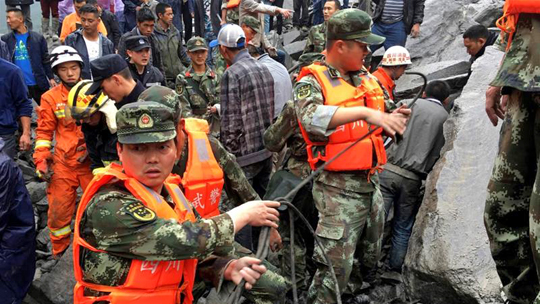China, Jun 24: More than 140 people are feared buried alive after torrential rain touched off a landslide in southwestern China, according to news agency reports.

The landslide hit the village of Xinmo, in Maoxin county of Sichuan province, at about 6am local time (22:00 GMT Friday), the Xinhua report said.
A couple and a baby were rescued and taken to hospital after 46 homes in Xinmo were destroyed by boulders when the side of a mountain collapsed, according to the Maoxin county government.
Maoxian county is home to about 110,000 people, according to the government's website.
The landslide also blocked a 2km-section of a river. Wang Yongbo, a local rescue official, told state broadcaster CCTV that an estimated three million cubic metres of earth and rock had slid down the mountain.
Xinmo is known locally for tourism and Chinese reports said it was unclear if tourists were among the people buried by the landslide.
'Geological disaster'
An emergency response "to the first-class catastrophic geological disaster" is under way, the statement said, adding that the full extent of the landslide is at yet unclear.
Search and rescue efforts are under way involving about 500 rescuers, including police.
Rescuers are using ropes to move a massive chunk of rock while dozens of others are searching the rubble for survivors, according to videos posted by the Maoxian government on its Weibo social media account.
Bulldozers and heavy diggers have been deployed to remove boulders, the images showed. Medics were seen treating a woman on a road.
"It's the biggest landslide in this area since the Wenchuan earthquake," Wang Yongbo, one of the local officials in charge of rescue efforts, said, referring to the disaster that killed 87,000 people in 2008 in a town in Sichuan.
Al Jazeera's Florence Looi, reporting from Beijing on Saturday, said the landslide "was reportedly triggered by heavy rain - the Chinese weather department had issued a warning of heavy rain a couple of days ago".
It was not immediately clear if Sichuan was included in the alert or not.
China has been experiencing weeks of heavy summer rains that often cause flooding and cause landslides in rural and mountainous regions.
At least 12 people were killed in January when a landslide struck a hotel in central province of Hubei.
In October landslides struck eastern China in the wake of torrential rains brought by Typhoon Megi, causing widespread damage and killing at least eight.





Comments
Add new comment